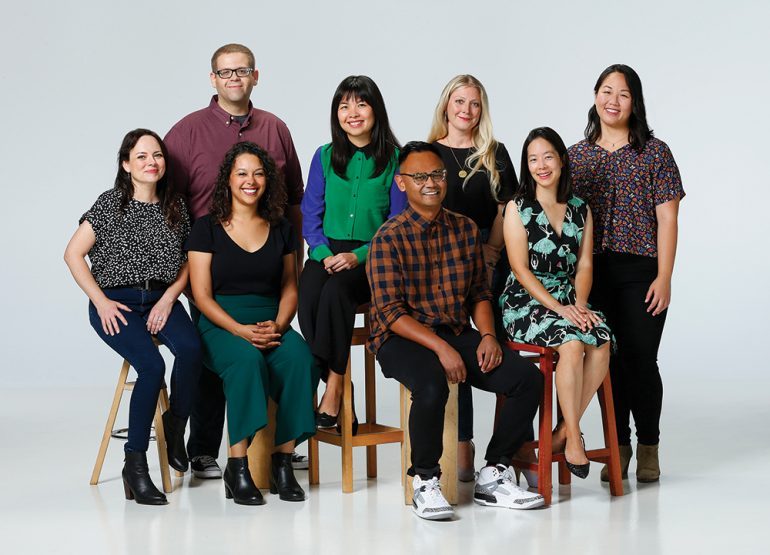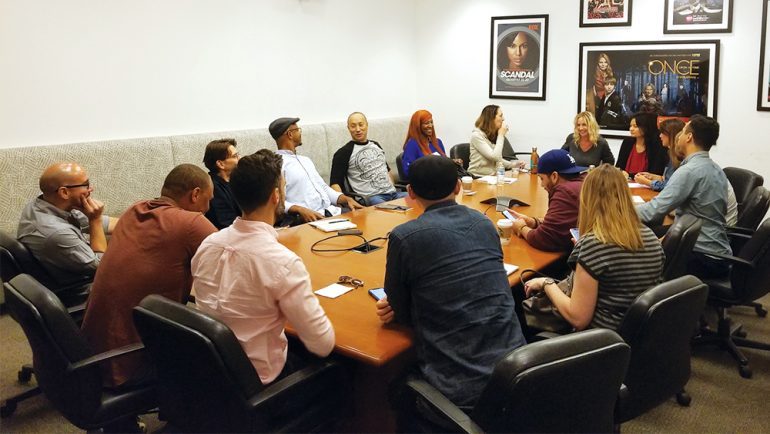Directing and Writing Programs Aim to Establish Diverse Roster of Industry Players
By Whitney Friedlander
LOS ANGELES (Variety.com) – Hollywood is well aware that diversity and representation are essential parts of putting together a television writers’ room when it comes to both well-rounded storytelling and good, old-fashioned optics. Recent years have shown that one of the most popular ways to do this is start ’em early: most every network and studio has a workshop, lab or fellowship expressly aimed at honing the talents of budding TV writers.
So just how successful are they? While none can promise immediate employment to entry-level writers who complete their programs, the odds of landing that first staff job after graduation or during the course of these workshops seem quite good compared to those who don’t enroll in such a program.
Raamla Mohamed says she started her fellowship with the Disney | ABC Writing Program — the only studio or network program that pays — with $6 in her bank account. She now has an overall deal with ABC Studios.
Keto Shimizu says NBC’s Writers on the Verge program “was absolutely my big break.” Karen Horne, the senior VP of programming talent development & inclusion for NBC Entertainment and Universal Television Studios, knew she was a die-hard superhero fan and became what Shimizu describes as “relentless” about getting her a meeting on then-NBC Batman series “The Cape.” Shimizu’s now an exec producer on the CW’s “DC’s Legends of Tomorrow.” (Not everyone is so fortunate, Horne references writer Britt Matt, who was three years out of Writers on the Verge before she got staffed at both NBC’s “Marlon” and “A.P. Bio”).
And while not all of these programs specifically pick candidates from underrepresented communities, they do tend to fill the majority of the spots — a game-changer for those normally on the other side of things.
“I was the only white male in [my] program, which was a fantastically enlightening experience,” says Chris Masi, a graduate of NBC’s Writers on the Verge. He’s continued to encounter similar situations with his staff jobs on ’s “Being Mary Jane” and Fox’s “Star” — where he’s worked with writers, and created characters, who don’t come with his background and serve as reminders to him that “my references aren’t like this monolithic decision on what’s good and what’s bad.”
Masi, like most, applied several times to several different writers programs. Entrance to all of them is, not surprisingly, extremely competitive and requires a good deal of patience and an inner belief that there’s always next time. Although the programs are not uniform in instruction, they do come with the expectation that applicants already possess the gift of prose.
“The original intent was to change the landscape of what staffs look like [and] in the past three or four years, it’s really about teaching our writers the business of television,” says Jeanne Mau, CBS’ vice president of entertainment diversity and inclusion who oversees its Writers Mentoring Program.
They also require some brand awareness. Or, as Kelly Edwards, HBO SVP of talent development who oversees the HBOAccess Writing & Directing Fellowships, puts it: “If they want to write for kids’ programs, then we can’t necessarily help them.”
Still, as utopic as they sound, these programs are by no means perfect. Mau says that her “biggest focus is retention; how do you get in a room and stay in a room” because “the main intent is to ultimately build showrunners.”
“The original intent was to change the landscape of what staffs look like.”
Jeanne Mau
Fox Writers Lab grad Yasemin Yilmaz says she feels “once you’re out of the program, especially after a year or two, you’re expected to kind of go off on your own.”
Rayna McClendon, who was part of NBC’s Writers on the Verge, brings up the elephant in the room: “they’re trying to do Band-Aid work because that all changes when you get in the room.”
She’s not alone in feeling this.
“I think these programs could improve on standards for how that staff writer is to be utilized,” says venerable producer and showrunner Glen Mazzara, who has spoken at several workshops and hired graduates of these programs. He adds that “one of the big problems we’re having in the industry is that studios and networks are afraid to direct their showrunners on how to appropriately manage their staff when it comes the question of gender and race.”
Mazzara says he’s heard of diversity hires — a term, he stresses, that has not uniformly been defined by Hollywood — who start later in the show’s run than the rest of the room or are passed over for script assignments. At the end of the season, they could also be denied the all-important promotion from staff writer to story editor; a financial hit, as this takes away their chances of receiving a script fee if they do write an episode. Or they could not be asked back at all.
| Members of NBC’s “Writers on the Verge” Program gather for a group photo Pamela Garcia Rooney, from left, Edward Excaliber, Marissa Lee, Margot Ye, Bernard Badion, Sara White, Joanne Lee and Tiffany Shaw Ho. |
Tim McNeal, ABC’s vp of creative talent development and inclusion, is countering this problem with a database that houses details on past graduates of his program’s nearly 30-year run.
He always has a name ready when a showrunner asks. And WGA has its own program specifically for members who, perhaps after completing one of the studio or network’s programs and gone through a round of staffings still end up “falling by the wayside because you’re no longer the free writer,” says Tery Lopez, WGA West’s director of inclusion and equity.
There’s also more to come.
Sue Obeidi, the director of the Muslim Public Affairs Council’s Hollywood bureau, says her organization has “noticed a trend where the industry is responding to us and to our stories and so we thought we need to help the community of screenwriters hone their craft.” To do this, they recently began holding screenwriting labs with Disney/ABC TV and Wise Entertainment and plan to add more in 2019.
“We’re constantly trying to introduce executives to our screenwriters, getting them one-on-one interviews and asking our screenwriters to apply to the writers programs,” Obeidi says.
Also coming next year: Sony Pictures TV will launch its diverse writers program, which will focus on emerging talent and is not to be confused with its already successful writers scheme on the features side.
Slowly but surely, diversity and representation are becoming less talking points and more ways of life.


